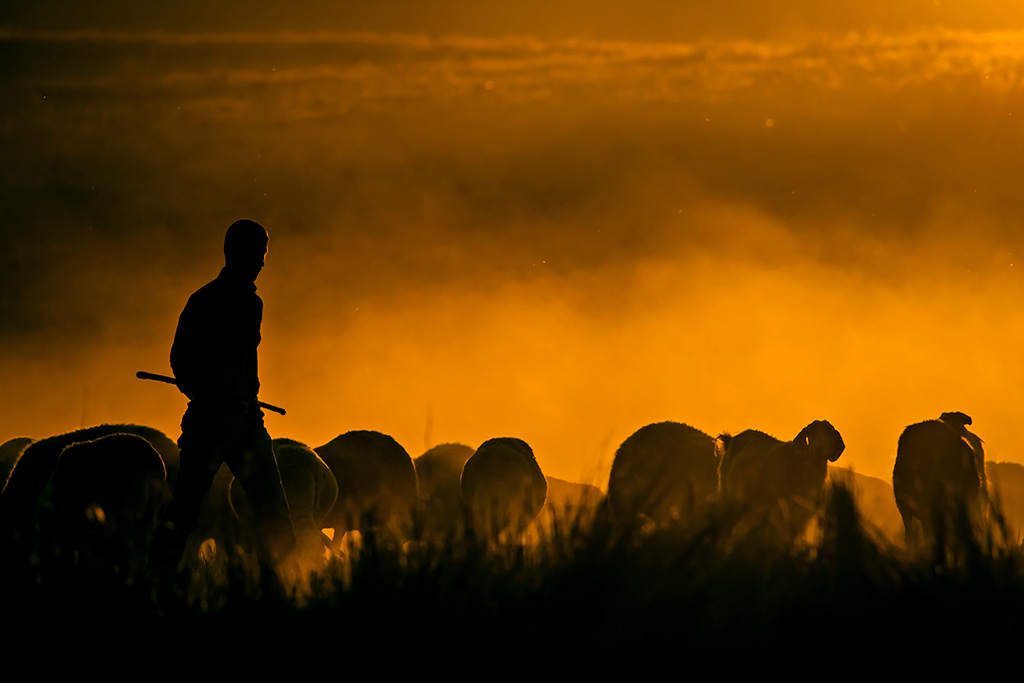
Psalm 23: The Shepherd’s Psalm
This beautiful, brief psalm is one of the most often memorized and recited texts in the entire Bible. It sits at the beginning of a book that is widely recognized as having been the hymnbook for the ancient people of Israel. It has also given deep comfort to many who find themselves in difficult circumstances, as it is often used in the context of funeral services.
In short, billions of people around the world have found comfort and the reassurance of God’s provision and protection in the words of David, whose long experience as a shepherd—first of actual sheep, and then of the people of Israel—uniquely qualified him to write this picturesque song.
A Deeper Look at Psalm 23
The different phrases of this psalm lead us to a greater understanding of the Lord’s great love and care for us, his followers:
“The LORD is my shepherd.”
When David proclaimed that God was his shepherd, he described to us the wonder of God reaching out to the individual. Indeed, this is the only place in the Bible where the author describes God as his personal shepherd. Though God’s flock numbers in the billions, he still cares for each one of us (1 Peter 5:7).
Also in claiming God as his personal shepherd, David recognized God’s authority over his life. And because God is gracious and cares for each one of us, we also submit to his authority and care. God knows what is best for all of us; he sees the end from the beginning, and his will for us is an outgrowth of his shepherding care and sovereignty over our lives.
“I lack nothing.”
In a society where food and water was scarce, the shepherd’s main job was to find fresh grass for the sheep to eat and safe water for them to drink. Sheep, as is commonly known, are not very bright. They can get themselves into trouble very quickly, and quite often do. So the shepherd had to lead them to the right supplies, always with an eye toward keeping them safe and healthy. This was what David had to do as a young man out in the wilderness, so he knew firsthand what God’s gracious provision looked like.
This short phrase points to David’s contentedness with God’s care. Whatever he doesn’t have outside of God’s provision, he doesn’t need. He’s perfectly supplied with the things that God wants to give him—no more, no less. That same contented attitude is encouraged in the New Testament as the apostle Paul reflects on his own circumstances (Philippians 4:12).
“He makes me lie down in green pastures.”
As the shepherds watched over their flocks, they sometimes literally made their sheep lie down to get them to rest so that the flock would settle and so that they could digest what they had eaten.
How often do we experience this in our own lives? God stops our plans for our lives and makes us sit on the sidelines. In the midst of a busy season at work, we have to have an emergency surgery and sit still and recover; the offer we made on the house we wanted isn’t accepted, so we start looking at other neighborhoods (which incidentally shows God’s direction for our families’ associations and our kids’ friends); a global pandemic changes our lives dramatically for a full two and half years, and we sit and wait.
Yes, sometimes God “makes us lie down.” When he does, we need to realize that the pastures we lie in are still green, and still a part of his provision. And we can then focus on what he wants to teach us in our season of waiting.
“He leads me beside quiet waters, he refreshes my soul.”
Sheep tend to be timid creatures. A rushing stream will intimidate a sheep, and one who falls into such water will find itself struggling to get back to safe ground because of the weight of the water soaking into its wool. Not only was it important for the shepherd to find fresh water for the sheep to drink, it was also important that this water be still.
David, as a shepherd in ancient Israel, looked for calm, safe waters for his sheep to drink. He knew that a sheep refreshed by these waters would be content in the shepherd’s care and less prone to wander.
Are you drinking from a fire hose in your life today? Remember that God offers times of refreshing for his people in the form of worship at one’s local church or online congregation. Pastors all over the world offer this kind of peaceful reflection and reassurance to God’s flock at regular intervals. Be sure you take advantage of these times to bring your family into a quiet place to drink from the well of God’s Word. It is truly soul-refreshing and rejuvenating.
The writer of Hebrews said it well: “And let us consider how we may spur one another on toward love and good deeds, not giving up meeting together, as some are in the habit of doing, but encouraging one another—and all the more as you see the Day approaching” (Hebrews 10:24-25).
“He guides me along the right paths for his name’s sake.”
The role of the shepherd guiding the sheep in right paths seems obvious, but how is God’s name involved in this?
David was careful to exalt the name of the Lord as he wrote this psalm. This phrase speaks to God’s appeal to his people to follow in his ways and in so doing honor who he is. While he was imperfect in doing so, scripture tells us that David’s daily motivation was to do exactly that.
God’s directives are not meant to keep people from “doing what they want to do” and so somehow restrict their lives and keep them closed in. Rather, “All the ways of the LORD are loving and faithful toward those who keep the demands of his covenant” (Psalm 25:10); “The LORD is righteous in all his ways and faithful in all he does” (Psalm 145:17). When we follow the loving directives that we find in the Bible, we honor God’s very name and expand his kingdom.
“Even though I walk through the darkest valley, I will fear no evil, for you are with me; your rod and your staff, they comfort me.”
Most people remember this as describing the “valley of the shadow of death” (which in fact the NIV footnote indicates). For sheep in the ancient world, dangers lurked all around. The rod was a club that David carried on his belt; it was used as a weapon against predators and sometimes thieves; the staff was a walking implement that David used to guide and direct the sheep to follow the right path, but it could also be used as a weapon.
The image here is one of the shepherd’s caring protection. Like sheep, we walk through “the valley of the shadow” every single day. There are a million ways that we can be tripped up, diverted, distracted, and taken away from the path that we should be on. That shadow takes many forms: greed, addiction, chronic illness, danger from human predators (both online and in real life), poor financial decisions and many other things…the list is virtually endless.
In all this, God is our protector. He provides guidance and relief in miraculous ways through the work of his Spirit in the world, and he uses human hands and feet to protect us in all kinds of different ways. Like sheep, we have no idea of the dangers that lurk in and around us during the course of our days. But God knows, and he sees all. Only in heaven will we know the extent to which God has protected us from our own foolish choices and from others who sought to do us harm.
As David wrote in this verse, the knowledge of God’s protective oversight should give us comfort each day as we try to follow God’s will and his way.
“You prepare a table before me in the presence of my enemies.”
This is a very poignant image. First of all, imagine the shepherd preparing a safe, secure place for the sheep to live in the visible presence of predators and thieves. Only the shepherd’s calm and care can reassure the sheep that they are safe and can rest.
Second, David’s identity as a warrior makes this phrase take on a very different tone. For David, being in the presence of his enemies was a harrowing position—one he experienced time and time again. Yet here he declares that God has set a peaceful space for him to exist and be fed and refreshed even though his enemies are literally in view.
When he wrote this, was David thinking of a specific time in which this actually happened? How about when he faced a giant on the field of battle (1 Samuel 17)? Or when he was being tracked by King Saul, who was out to kill him (1 Samuel 23:7—24:22)? How about when he had to flee to the Philistines and take sides against Israel (1 Samuel 27)? Or possibly when he had to run when his son Absalom tried to take the kingdom away from him? (2 Samuel 15-19)?
Understand that this image was very real to David, the warrior King. He had been in peril of his own life too many times to know that rescue didn’t come from his own hand. He knew that he was in God’s hands the whole time—safe and secure and provided for.
How wonderful is this same assurance for us today?
“You anoint my head with oil; my cup overflows.”
Anointing with oil in ancient times held significance for many reasons. It was used in indicating God’s chosen rulers in ancient Israel (1 Samuel 16); was used as a salve to heal wounds (Luke 10:25-37); and it was used as a sign of favor for guests in situations where hospitality was required (Luke 7:36-50), among other things.
Shepherds used oil to rub into the wounds and scrapes and cuts of their sheep. They well knew that an infection among some sheep would slow down the entire flock, so they were vigilant to make sure that each sheep was inspected on a regular basis. The oil brought comfort and healing to the sheep; even though they may not have liked the process of being inspected and treated, ultimately the shepherd knew what was best for their overall health and happiness.
God does the same for us. He has the foresight to understand where our wounds—physical, mental, emotional—cut us the most. While we can’t understand the depths of his healing treatment and care for us, he provides for us when and where we need it most: through technological advances in medicine, through skilled doctors and nurses, and through trained and sympathetic counselors and advisors.
Indeed, the Spirit himself is the one who brings comfort and healing to us when we need it most (Acts 10:38). In that way, our cup truly does overflow (John 7:38-39).
“Surely your goodness and love will follow me all the days of my life, and I will dwell in the house of the LORD forever.”
David pointed to God’s pervasive goodness and love even in the midst of a tumultuous life. As a husband, father, king, and warrior, he was able to take a look at his life in the context of all of its complexity and thank God for his sure and secure love and goodness. Whether he found himself laying in green pastures or facing the shadows of life’s valleys, David found solace in knowing that the Lord was and always would be his shepherd, filling every need he could possibly imagine.
As was David, we can be similarly confident of God’s love in our own circumstances. When we rest in that reassurance, we truly know what it is to “dwell in the house of the LORD”—both now and in the future. Perhaps this phrase sums it up best: “Psalm 23 essentially says that the best thing about having the Lord as shepherd is having the Lord as shepherd.”¹
Jesus, Our Shepherd
Jesus, the creator of the world, the author of our salvation, and the one who inspired David’s words, says this of himself in the Gospel of John:
“I am the good shepherd. The good shepherd lays down his life for the sheep…I know my sheep and my sheep know me—just as the Father knows me and I know the Father—and I lay down my life for the sheep. I have other sheep that are not of this sheep pen. I must bring them also. They too will listen to my voice, and there shall be one flock and one shepherd. The reason my Father loves me is that I lay down my life—only to take it up again. No one takes it from me, but I lay it down of my own accord. I have authority to lay it down and authority to take it up again. This command I received from my Father.” John 10:11-18
With these words, we can find the same comfort and encouragement as David found in the midst of his tumultuous life.
Have you given your life to Jesus? Do you know him as your Savior? Do you also know him as your loving shepherd, the One who teaches and guides you every day along the way? Your good Shepherd is eager to bring you into the fold and care for you. Talk to him today and surrender your life and your future into his hands. It’s the very best path you can possibly follow to honor God with the life that he’s given you.
Written by Mike Vander Klipp, a senior editor with the Zondervan Bible Group, where he’s been privileged to work for the past three decades. He and his family live in Grand Rapids, Michigan.
¹Jerome Creach, Psalm 23 commentary: https://www.workingpreacher.org/commentaries/revised-common-lectionary/fourth-sunday-of-easter-2/commentary-on-psalm-23-3
Find an NIV Bible that’s right for you! There’s an NIV Bible for every age and need – Bibles for study, devotions, journaling, classic reference, large print, youth, and more. Find yours today!







Article presents a clear picture of Jesus our Shepherd and points out that when we recognize Jesus as our shepherd, we acknowledge his authority over our lives.